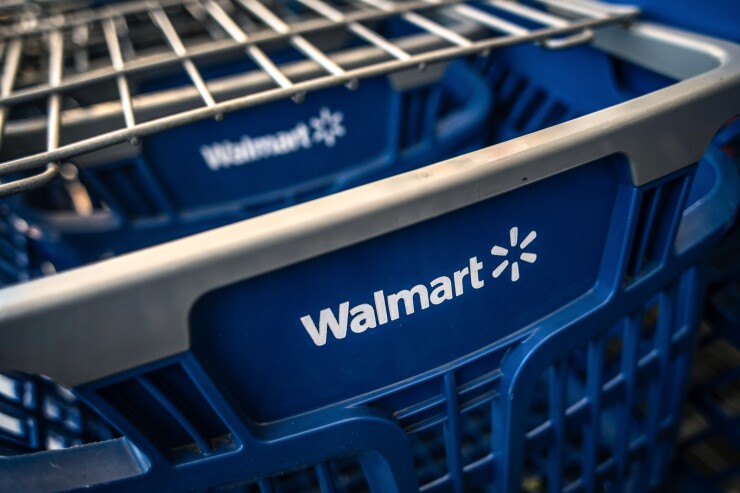
The current economic climate is stressing supply chain management, with Walmart adding business payment features designed to address clients' cash flow challenges while expanding its long-standing
"For small- to medium-size businesses and nonprofits, they need to be flexible and in times of uncertainty it's especially important," Ashley Hubka, senior vice president and general manager of Walmart Business, told American Banker.
Walmart is testing a product that offers extended payment terms and treasury management tools for businesses, nonprofits and government-affiliated organizations. While the big box retailer has long pushed a
What Walmart is adding
Walmart's Pay by Invoice works through TreviPay to set up 30-day terms for business purchases at Walmart. Buyers apply for a line of credit with TreviPay, with options to increase the credit limit as business needs evolve. The product is in pilot, with Walmart planning to expand availability in the coming months.
Walmart currently supports debit, ACH, credit card and gift card payments for business purchases, which limits some larger ticket items. Small businesses, nonprofits and schools use Walmart to buy supplies and large grocery orders for events. Larger purchases, particularly bulk supplies, can require credit or financing, which normally forces buyers to use a bank or other outside financial relationship. Pay by Invoice can keep more shopper activity under Walmart's umbrella. "We've noticed a need for more options," Hubka said.
Hubka said the B2B payments expansion is not a direct response to
Read more about tariffs (
"Some couldn't buy with us at all until we had Pay by Invoice,'" Hubka said. "This enables us to get more of their wallet share and spending so we can be a viable and competitive option."
The new payment product is not related to any moves
What tariffs can't solve
Walmart's new payment program is aimed at encouraging companies to choose the giant retailer as tariffs make imported-merchandise sales more expensive.
Economic uncertainty of any kind tends to make businesses more cautious about spending, and the macroeconomic trends, of which tariffs are only a part, are the bigger issue, Aaron Press, research director of worldwide payment strategies for IDC, told American Banker
"The Pay by Invoice solution looks like it offers a couple of advantages," Press said. "It gives businesses the option to make purchases using their usual invoicing processes, but it also offers a more flexible credit line beyond typical net terms, essentially a BNPL for B2B."
Tariffs are in part designed to encourage domestic manufacturing or sourcing from within the U.S.
But In the short to medium term, retailers and others will still be dependent on importing for items, according to Gareth Lodge, a senior analyst at Celent."While manufacturing of certain goods may be done domestically at some point, it's not something that can be instantly switched from existing suppliers," Celent's Lodge told American Banker.
The uncertainty, in part, therefore comes from what the tariffs will be, and when, Lodge said of the tendency of Trump's tariffs to change over time, or to be temporarily withdrawn.
"There have been large fluctuations in the levels, nor are they uniformly applied," he said. "That creates risk and uncertainty. If I order today, what price will it be in the future? Could it be cheaper elsewhere? What might the implications be on FX and payment terms?"
Walmart and other companies are investing to better support their supply chain, including visibility of cash positions to the ability to renegotiate pricing to estimation of future costs, Lodge said. "There will also be tools that look to optimize their processes as well, including how they manage their liquidity across borders. Many believe that stablecoins will help in this regard, though this is far from certain," Lodge said.





